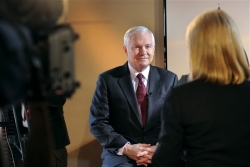Gates: Afghan Strategy Bears Fruit, Iraq on Track
American Forces Press Service
WASHINGTON, Feb. 9, 2010 — Noting signs that the new strategy in Afghanistan “is beginning to bear fruit,” Defense Secretary Robert M. Gates also said during an interview aired last night that the effort to build up Iraq’s security forces and move forward with the U.S. drawdown plan there remains on track.
Gates spoke with Fox News Channel’s Greta Van Susteren while visiting Rome, also addressing issues ranging from the Pakistani military’s operations in South Waziristan to Iran’s uranium enrichment activities.
The secretary noted signs of a possible turnaround in Afghanistan, as expressed last week at the NATO Ministerial in Istanbul by Army Gen. Stanley McChrystal, the top U.S. and NATO commander on the ground. “He thought the situation was still serious, but no longer deteriorating,” Gates said.
“I think we are beginning to see the impact of the Marines going into Helmand province. We are beginning to see the impact of increased forces in other places,” Gates said. “I think part of what many of us are feeling is that there’s an intangible increase in confidence and hope, both on the part of the Afghans, but also on the part of the nations that are with us in there, trying to help.
“There are some small signs that the strategy that General McChrystal is following is beginning to bear fruit,” he added.
But Gates emphasized that the fight is far from over. “It is still going to be a hard fight. There’s some very hard days ahead,” he said.
The new strategy measures success, not in how many Taliban are killed, but by how many Afghans are protected, the secretary noted. As the Taliban’s momentum begins to reverse, Gates said he expects more lower-level militants to put down their weapons and rejoin Afghan society through President Hamid Karzai’s reintegration effort.
Gates said he’s seeing initial indications that reintegration is working.
“We have to do two things: create conditions in which [former Taliban] can have a job and provide them security to protect them and their families [from Taliban reprisals],” Gates said. “But the key is, it seems to me, is that reconciliation has to be on the terms of the Afghan government and consistent with the Afghan constitution.”
Turning to Iraq, Gates said Army Gen. Raymond Odierno, the top U.S. commander there, is “pretty comfortable” with the arrangements made to ensure a responsible drawdown of U.S. forces.
“The Iraqi security forces have continued to improve. We will continue that training role with them through 2011. We’ll continue to do counterterrorism operations with them,” Gates said. “But we are pretty much on schedule” with the drawdown plan.
Gates pointed to the recent, high-visibility attacks as al-Qaida’s desperation to inflict ethnic division and make a comeback. “All the information we have points to al-Qaida in this,” he said. “They are somewhat resurgent. That’s why we will continue to work with the Iraqi security forces in trying to take these guys out.”
Meanwhile, he said he’s reassured that the political process in Iraq, which, although not progressing as smoothly as hoped, is proceeding democratically. “When it comes to politics in Baghdad, reality is, these guys are trying to solve their problems politically rather than with guns,” he said.
Regarding Pakistan, Gates acknowledged the strong offensive the Pakistani military is conducting in South Waziristan and elsewhere around the country – one he said is exceeding all expectations.
“If you had told me 18 months or two years ago that the Pakistani army would be operating in South Waziristan, that they would have gone in the Bajaur Agency [within the Federally Administered Tribal Areas], that they had gone into Swat [Valley], I would have thought that would have been a miracle,” he said.
“We always want them to do more,” Gates said. “They push back. They are going to do it their own way. We will help as much as possible.”
He reiterated the message he delivered while visiting Islamabad last month. “We are in this car together, but we recognize on your side of the border [with Afghanistan], you are in the driver’s seat and you’ve got your foot on the accelerator,” he said.
“There has been improvement in coordination,” he continued. “And frankly, I think the Pakistanis have done a terrific job.”
Gates expressed concern about Iranian President Mahmoud Ahmadinejad’s defiance of the international community in moving forward with nuclear enrichment. The United States and the international community have given Iran ample opportunity to provide reassurances of its intentions, and that it will stop violating the Nuclear Non-Proliferation Treaty and U.N. resolutions, he said.
“The response has been consistently disappointing,” he said, “So now we are in a position to turn to the pressure track and get broad international support for serious sanctions in terms of trying to get the Iranian government to change its approach.”
More of Van Sustern’s interview with Gates is scheduled to run tonight, with the focus expected to be on a possible overturn of the “Don’t Ask, Don’t Tell” policy that bans gays from serving in the military.
Source:
U.S. Department of Defense
Office of the Assistant Secretary of Defense (Public Affairs)

 von
von 